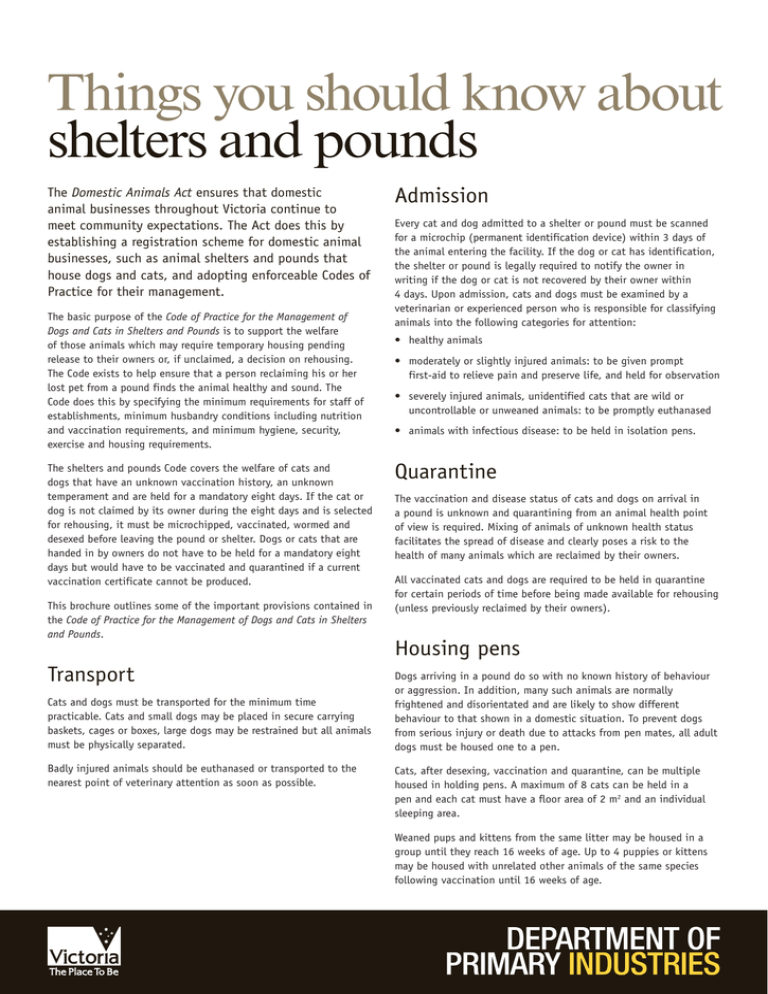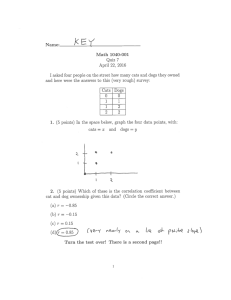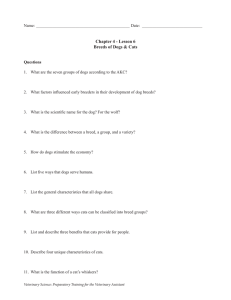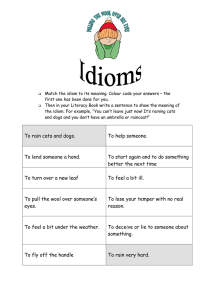Things you should know about shelters and pounds
advertisement

Things you should know about shelters and pounds The Domestic Animals Act ensures that domestic animal businesses throughout Victoria continue to meet community expectations. The Act does this by establishing a registration scheme for domestic animal businesses, such as animal shelters and pounds that house dogs and cats, and adopting enforceable Codes of Practice for their management. The basic purpose of the Code of Practice for the Management of Dogs and Cats in Shelters and Pounds is to support the welfare of those animals which may require temporary housing pending release to their owners or, if unclaimed, a decision on rehousing. The Code exists to help ensure that a person reclaiming his or her lost pet from a pound finds the animal healthy and sound. The Code does this by specifying the minimum requirements for staff of establishments, minimum husbandry conditions including nutrition and vaccination requirements, and minimum hygiene, security, exercise and housing requirements. The shelters and pounds Code covers the welfare of cats and dogs that have an unknown vaccination history, an unknown temperament and are held for a mandatory eight days. If the cat or dog is not claimed by its owner during the eight days and is selected for rehousing, it must be microchipped, vaccinated, wormed and desexed before leaving the pound or shelter. Dogs or cats that are handed in by owners do not have to be held for a mandatory eight days but would have to be vaccinated and quarantined if a current vaccination certificate cannot be produced. This brochure outlines some of the important provisions contained in the Code of Practice for the Management of Dogs and Cats in Shelters and Pounds. Transport Cats and dogs must be transported for the minimum time practicable. Cats and small dogs may be placed in secure carrying baskets, cages or boxes, large dogs may be restrained but all animals must be physically separated. Badly injured animals should be euthanased or transported to the nearest point of veterinary attention as soon as possible. Admission Every cat and dog admitted to a shelter or pound must be scanned for a microchip (permanent identification device) within 3 days of the animal entering the facility. If the dog or cat has identification, the shelter or pound is legally required to notify the owner in writing if the dog or cat is not recovered by their owner within 4 days. Upon admission, cats and dogs must be examined by a veterinarian or experienced person who is responsible for classifying animals into the following categories for attention: • healthy animals • moderately or slightly injured animals: to be given prompt first-aid to relieve pain and preserve life, and held for observation • severely injured animals, unidentified cats that are wild or uncontrollable or unweaned animals: to be promptly euthanased • animals with infectious disease: to be held in isolation pens. Quarantine The vaccination and disease status of cats and dogs on arrival in a pound is unknown and quarantining from an animal health point of view is required. Mixing of animals of unknown health status facilitates the spread of disease and clearly poses a risk to the health of many animals which are reclaimed by their owners. All vaccinated cats and dogs are required to be held in quarantine for certain periods of time before being made available for rehousing (unless previously reclaimed by their owners). Housing pens Dogs arriving in a pound do so with no known history of behaviour or aggression. In addition, many such animals are normally frightened and disorientated and are likely to show different behaviour to that shown in a domestic situation. To prevent dogs from serious injury or death due to attacks from pen mates, all adult dogs must be housed one to a pen. Cats, after desexing, vaccination and quarantine, can be multiple housed in holding pens. A maximum of 8 cats can be held in a pen and each cat must have a floor area of 2 m2 and an individual sleeping area. Weaned pups and kittens from the same litter may be housed in a group until they reach 16 weeks of age. Up to 4 puppies or kittens may be housed with unrelated other animals of the same species following vaccination until 16 weeks of age. Identification Public access Dogs and cats must be microchipped prior to the animal being sold. Upon sale the proprietor must provide the new owner’s details to the council where the animal is to be kept. Reasonable periods for public access must be provided during working hours and include reasonable times after hours or at weekends. Public access at pounds may be by appointment with the Ranger. Vaccination All dogs sold from a pound or shelter must be vaccinated against distemper, hepatitis and parvovirus. All cats sold must be vaccinated against feline infectious enteritis, calicivirus and herpes virus. Re-housing (sale of animals) All cats and dogs sold from a pound or shelter must be microchipped, wormed, desexed and vaccinated. Sick, aggressive, pregnant, unweaned, anti-social or deformed animals, or animals with known vices such as excessive barking, fence jumping (dogs) must not be made available for sale. New owners must be supplied with a vaccination certificate and be given literature about feeding, housing and responsible pet ownership. If a cat or dog is not acceptable to a purchaser because of health or other reasons that are supported by a statement from a veterinarian, excluding accidents, within seven days of purchase, pound or shelter proprietors must take the animal back and refund all monies or offer a replacement animal with the same guarantee. Remember If you really care about your dog or cat – Register it! Cats and dogs must be registered with the local council from three months of age. Cats and dogs being registered for the first time must also be microchipped prior to registration. Cats and dogs should wear their identification tag which will assist the return of your pet in the event that it does become lost and finds itself in the pound. If you seize a stray, lost cat or dog the law requires you to take that animal, as soon as is reasonably possible, to the pound of the municipal district in which the dog or cat is found. The Domestic Animals Act is State legislation which is implemented by Municipal Councils. A complete copy of the Code of Practice for the Management of Dogs and Cats in Shelters and Pounds is available at www.dpi.vic.gov.au/animalwelfare or from the DPI Customer Service Centre, phone 136 186. If a cat or dog is returned within 3 days for any other reason, the pound or shelter proprietor must refund 75% of the purchase price or offer a replacement animal with the same guarantee. If the cat or dog dies or is euthanased as a result of a disease that is traceable to the point of sale, the pound or shelter proprietor must refund the purchase price or offer a replacement animal with the same guarantee. Published by the Department of Primary Industries, April 2010. © The State of Victoria 2010. This publication is copyright. No part may be reproduced by any process except in accordance with the provisions of the Copyright Act 1968. Authorised by the Department of Primary Industries, 1 Spring Street, Melbourne 3000. www.dpi.vic.gov.au ISBN 0 7311 4293 4 (print) ISBN 978-1-74264-067-9 (online) Disclaimer This publication may be of assistance to you but the State of Victoria and its employees do not guarantee that the publication is without flaw of any kind or is wholly appropriate for your particular purposes and therefore disclaims all liability for any error, loss or other consequence which may arise from you relying on any information in this publication. For more information about DPI go to www.dpi.vic.gov.au or phone the Customer Service Centre on 136 186. GG/S&P/0410 If you would like to receive this information/publication in an accessible format (such as large print or audio) please call the Customer Service Centre on 136 186, TTY 1800 122 969, or email customer.service@dpi.vic.gov.au.




